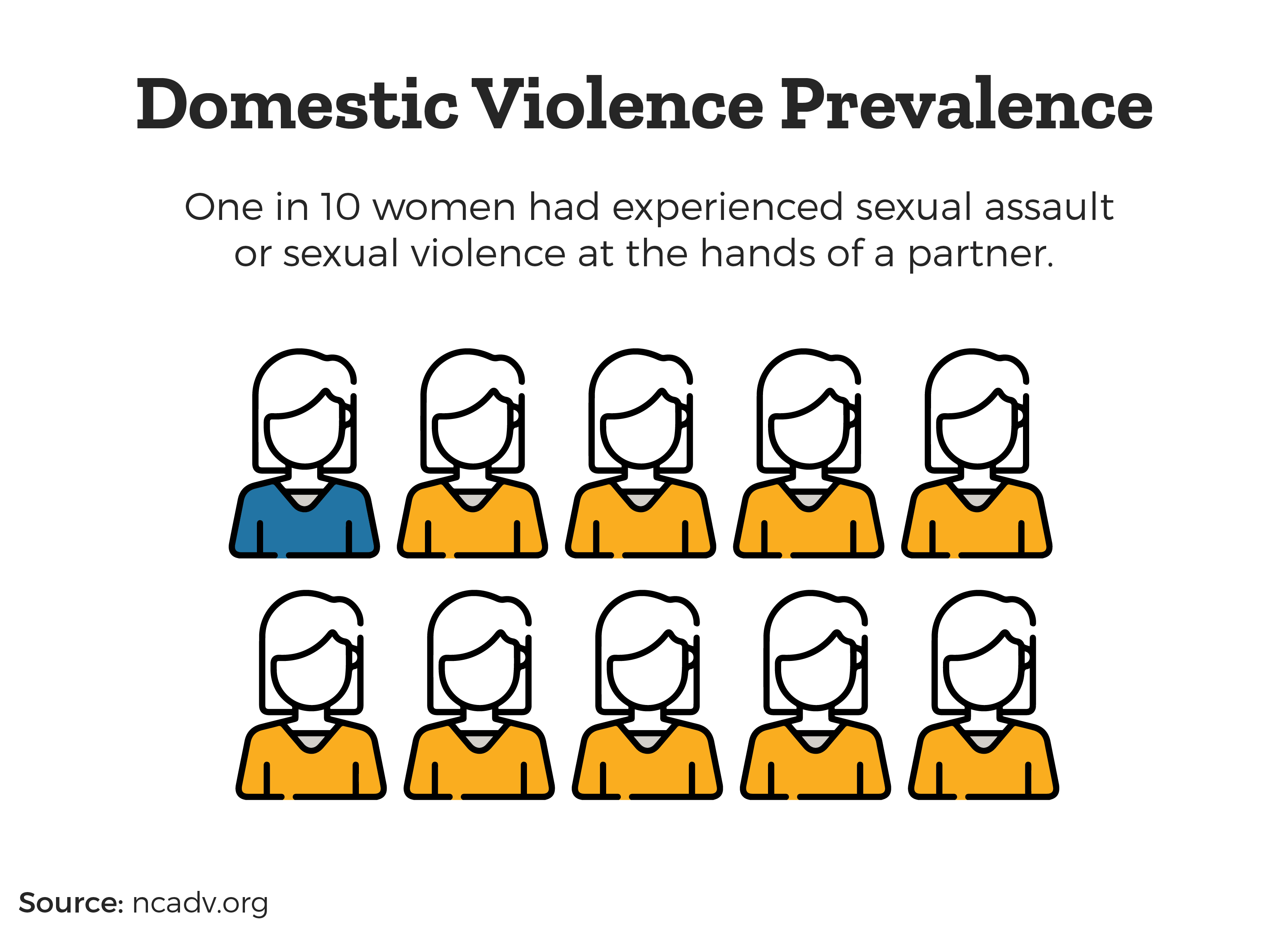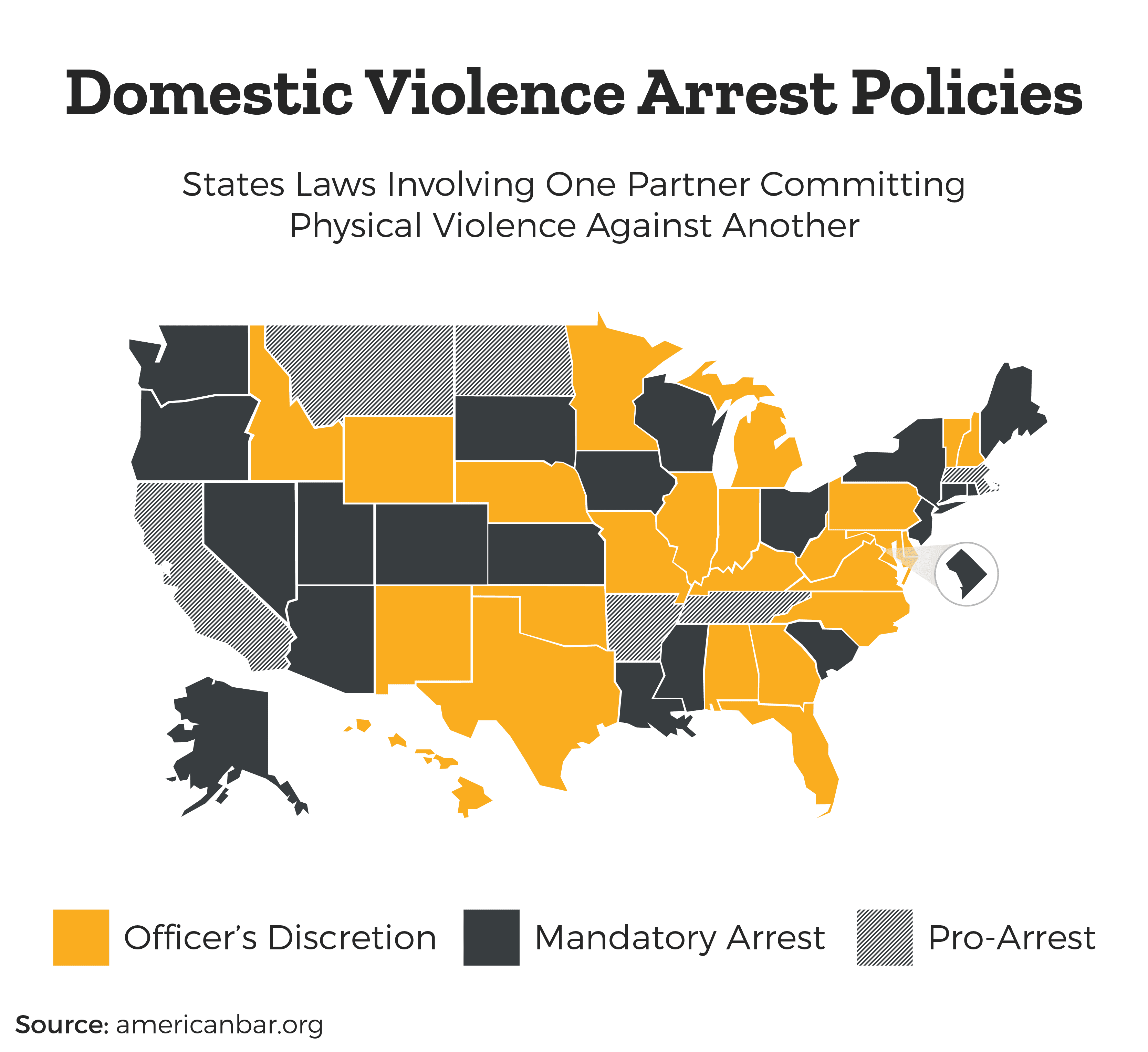Every 60 seconds, 20 Americans are hurt by a spouse or romantic partner. Domestic violence – also known as intimate partner violence – affects people of all races, genders, religions, sexual preferences, and income levels. In addition to the physical and emotional wounds, survivors of domestic violence often face legal problems. This guide will explore some common legal issues created by domestic violence.

Domestic violence occurs when a person intentionally harms a current or former romantic partner. It includes physical violence such as hitting, slapping, and punching. While hitting is the most well-known type of physical assault, abusers can hurt their victims in many ways. Some abusers throw objects at their victims. Other abusers use sexual assault as a means of control. One in 10 women have experienced sexual assault or sexual violence at the hands of a partner. All of these violent acts harm victims’ bodies and minds.
While most people think of physical abuse when they think of domestic violence, abuse can take other forms. Emotional abuse (also known as psychological abuse) destroys the victim’s self-esteem and self-worth over time. Some emotional abusers use words, while others isolate their partners from friends and family members. Still, others use threats against pets or loved ones. Financial abuse keeps victims dependent on their abusers. In economic abuse, abusers do not allow their victims to earn or have money of their own.
According to the Rape Abuse and Incest National Network (RAINN), violence can be inflicted on men, women, and children through emotional duress, stalking, psychological abuse, threats, or mental manipulation. Unfortunately, these abuses are all too common in relationships, many of which are experienced in domestic partnerships. It is important to be mindful when discussing domestic violence, as anyone can be a victim.
An abusive relationship can include one or many types of controlling behaviors, to give abusers power and control. All types of abuse create an air of fear that keeps the victim from leaving or seeking help.
How Does the Law Handle Domestic Violence?
Each state approaches domestic abuse differently. As a result, there is no one legal definition of domestic violence. However, in every U.S. jurisdiction, violent acts such as hitting are criminal felonies or misdemeanors. Some states treat these crimes like any other assault or battery. Other states punish physical contact more harshly when the victim is a romantic partner.
Because domestic violence often goes beyond hitting, states have changed their laws to cover more types of abusive conduct. Some states treat trespassing, disorderly conduct, and similar crimes as domestic violence when the victim is a romantic partner. Other states have added animal cruelty, harassment, stalking, and cyber stalking to the list of domestic crimes.

States have also passed laws that tell law enforcement officers how to respond to intimate violence. In decades past, officers called to violent homes would tell abusers to “cool off” but not arrest them. Because the abuser was free, the victim was still in danger. To protect victims, many states have passed mandatory arrest laws. These laws require officers to arrest one or both parties at the scene. Although the practice is not without controversy, these laws encourage swift action to protect victims.
Nationwide local community sexual and domestic violence agencies have increased their victim rights activism exponentially. In just a few short years, the legal profession has done an about-face in how they approach and work with their victimized clients. The American Bar Association Commission is working diligently on domestic and sexual violence by implementing the Survivor Reentry Project (SRP). The SRP trains attorneys on how to properly work with survivors of violent situations like dating violence, workplace assaults, and marital rapes, among others.
Today, however, attorneys are very committed to safety planning for victims. They are working with courts, community agencies, federal and state lawmakers and violent crime entities to ensure that the system operates in a fair and just manner for all victims and survivors of domestic and sexual assault crimes.
How Can the Legal Community Help Victims?
Attorneys are enhancing their sexual assault legal services to serve as a key component of their firm. The legal industry is providing more pro bono services, as well as building on more inclusive sexual assault partnership skills. They are creating a community of legal representatives who can and will provide survivor services that focus on a supportive and informed approach toward a foundation of freedom.
How can the legal community help victims and survivors of domestic and sexual violence when they walk into the office? When victims walk into an attorney’s office, the legal staff are prepared to assist with either a sexual assault civil lawsuit (beyond a preponderance of the evidence) or a criminal case (proof beyond a reasonable doubt).
Proof beyond a reasonable doubt in a criminal case is based on the state controlling the proceedings, and victims serve as witnesses to help shape the case. A civil lawsuit does not endeavor to determine the innocence or guilt of the offender but attempts to determine whether the offender is liable for any injuries sustained as a result of the violent act or assault.
What rights do domestic violence victims have in criminal cases?
Most states grant victims several rights. Chief among these is the right to be safe during court proceedings. Victims have the right to ask for separate waiting areas, staggered court times, and other measures to keep them safe. (Note: These laws only apply in court. To be safer at home, a victim should get a restraining order.) These laws also require that the victim be notified of the abuser’s release or escape from prison.
Most states require that victims be notified of all court proceedings involving the abuser, such as guilty pleas, sentencing, and parole hearings. Generally, the victim has the right to speak at these events. Most judges consider the impact on the victim when making decisions about jail time or release.
Finally, domestic violence causes victims financial harm. According to some reports, each abuse-related hospital visit costs over $4,000. Victims also miss work, causing them to lose thousands of dollars in pay. To help victims recover these costs, some states offer restitution. Restitution is money that victims receive to help them pay the bills created by the defendant’s crime.
Will domestic violence affect my divorce?
Years ago, the only way to get a divorce was to prove that the other spouse had made the marriage unbearable. If a spouse alleged abuse, the divorce would be granted. But today, most states use “no fault” divorce. In a “no fault” state, a person need not allege or prove abuse to get a divorce. Even in a “no fault” jurisdiction, evidence of abuse may influence decisions on alimony, property division, and other matters.
Will my abuser be able to see our children?
Nearly all states direct judges to consider the best interests of the child when making a custody decision. Most judges are aware that children raised in abusive environments suffer significant, lasting harm. So judges rarely award sole custody to abusive parents. However, judges weigh many factors in custody cases, so no outcome can be guaranteed.
Abuse may also impact visitation rights. In all but the most extreme cases, courts hesitate to cut all ties between a parent and child. As such, even abusive parents may be granted visitation. Courts often order supervised visits until the abuser proves that the children are safe. The court may also order a neutral drop-off location to protect the abused parent.
Can my job fire me for being a victim of domestic violence?
No federal law bars discrimination against domestic violence victims. However, many state laws do. In these states, employers cannot fire, demote, or take other adverse actions against victims of intimate partner violence.
However, these laws vary widely and do not apply to all cases or victims. Some laws apply to businesses with as few as three workers, while others require 50 or more employees. In some states, the employee must work for the company for a certain amount of time before the law applies.
Can I be fired if I miss too much work to address medical issues caused by domestic violence?
In many states, employers cannot fire workers who take time off to address injuries resulting from abuse. However, in most of these states, the employer can ask for a doctor’s note or other proof of injury. (These states require the employer to keep this information secure and confidential.) Also, in some states, employees must use all of their personal or sick leave before applying for leave under state law.
Federal law provides a bit more relief for victims. Under the Family and Medical Leave Act of 1993, eligible employees can take 12 weeks of unpaid leave each calendar year no matter the cause of the injury.
Can I take time off from work to attend court proceedings?
Nearly every state has a law that allows crime victims to take time off to attend court proceedings. Some states have laws that are specific to domestic violence victims, while other states’ laws apply to all victims of crime. Some states even require companies to treat this as paid leave. However, most states cap the amount of time victims can take off in any year. Also, as with medical leave, these laws usually allow employers to ask for proof.
Can my landlord evict me if I am a victim of domestic violence?
The answer depends on the type of housing involved. No federal law covers private landlords, but in many states, landlords cannot use domestic violence as grounds for eviction. However, even some of these states allow eviction under limited circumstances. For example, if the abuser poses a danger to other tenants, the eviction may proceed.
Residents of public housing are protected by federal law. The Violence Against Women Act (VAWA) applies to persons living in federally funded housing. (The law covers those in public housing and with Section 8 vouchers.) VAWA states that victims of domestic violence cannot be evicted solely for that reason.
Can my landlord evict my partner if he/she is a batterer?
Again, the answer turns on the type of landlord. Most states allow private landlords to protect victims and their families. In these states, landlords can change locks or remove the abusive tenant from the property. Additionally, most states allow the victim to break the lease.
Under VAWA, those living in federally funded homes have the right to ask the landlord to remove the abuser. The landlord can also split the lease to allow the victim to leave without risking the victim’s future housing benefits.
Will I get past it?
Positive changes are taking place to bring what was once a hidden taboo out into the forefront. Those who have suffered from an abusive relationship are often fearful of reporting the incident for the following reasons:
- Feeling embarrassed
- Denial about the assault
- Fear they will not be taken seriously
- Fear of retaliation
Survivors of domestic or family violence have always had the moral and legal right to report their violations and take legal action. Due to aggressive support from organizations like RAINN, No More, the National Alliance to End Sexual Violence, Know Your IX, and so many more, the domestic violence atmosphere has changed in favor of and support for victims of all ages and gender.

What should I do if I or someone I know is a victim of domestic violence?
If you know of or suspect that someone is a victim of domestic violence or a sexual assault, you may feel powerless about the best way to help. Do not let this fear keep you from taking action because each day for an abused victim is a day of loneliness, isolation, and fear. Reaching out and letting them know that you are there for them can give victims the impetus they need to take action on their own behalf.
To end the violence, it takes a village. It is time to help yourself or a friend who is being abused by speaking up. Invite sufferers to talk about these issues. It will help end the shame and stigma associated with domestic violence and sexual assault. We all should play a role in preventing violent action, but if it does occur, look out for one another’s well-being.
As a victim, you did nothing wrong! By talking about the assault, it will help your self-esteem and self-worth, even though it is a difficult thing to do. Talk with people who can listen and understand, like close friends or family members. Also, community counselors, lawyers, human services organizations, and sexual assault centers are staffed with qualified professionals, some of who have experienced the same violence. Remember, you are not alone!
Call The National Domestic Violence Hotline or another resource. If you know or suspect that someone you love is being abused, be supportive. Do not pass judgment. When the time comes, praise your friend or loved one’s efforts to seek safety and provide encouragement along the way. If you or someone you know is struggling with any legal issues related to domestic abuse, contact an attorney immediately.
